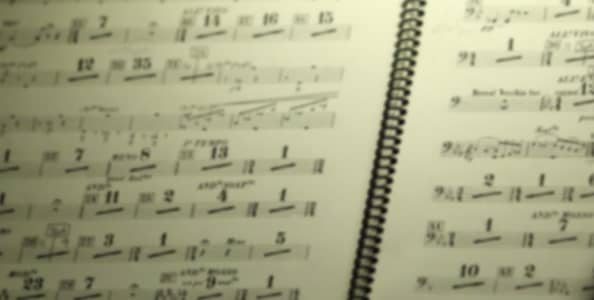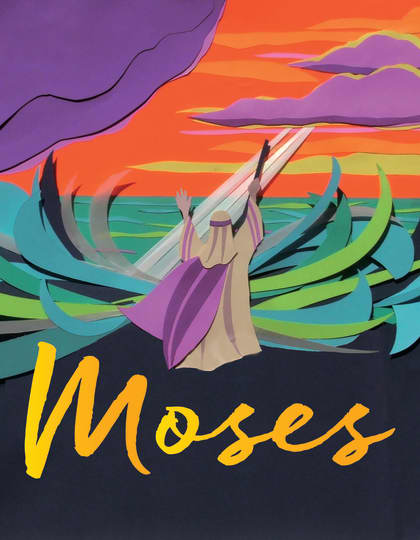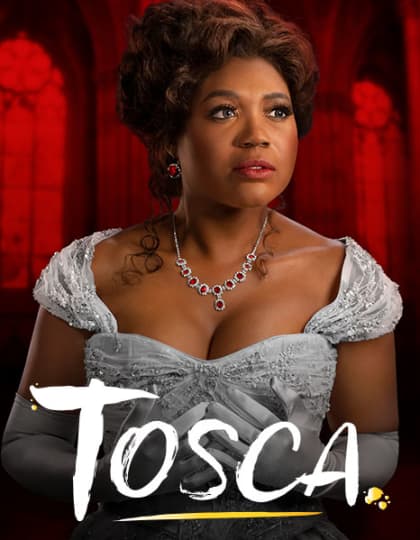The crime that defined an era
Lina González-Granados, LA Opera's dynamic new Resident Conductor, leads a concert performance of Britten’s haunting chamber opera, starring the brilliant singers of the company's Domingo-Colburn-Stein Young Artist Program, including mezzo-soprano Sarah Saturnino as Lucretia.
In ancient Rome, Lucretia’s husband is away, assigned to a military post outside the city. When the Prince of Rome knocks at her door, she’s honor-bound to welcome him into her home, unaware that her unexpected guest is driven by a truly despicable impulse. The brutal assault will rattle the foundations of the kingdom and incite the overthrow of a dynasty.
Performers
- Conductor
- Lina González-Granados
- Lucretia
- Sarah Saturnino
- Tarquinius
- Ryan Wolfe
- Male Chorus
- Anthony León
- Female Chorus
- Alaysha Fox
- Collatinus
- Alan Williams
- Bianca
- Madeleine Lyon
- Lucia
- Tiffany Townsend
- Junius
- Cedric Berry
Lina González-Granados
Conductor

From: Cali, Colombia. LA Opera: Lucia di Lammermoor (2022, debut); The Rape of Lucretia (2023). She became Resident Conductor in 2022.
Praised for her "attention to orchestral colors" (OperaWire) and ability to create "lightning changes in tempo, meter, and effect" (Boston Musical Intelligencer), Colombian-American Lina González-Granados has distinguished herself nationally and internationally as a talented young conductor of symphonic and operatic repertoire. Her spirited interpretations of the orchestral repertoire, as well as her dedication to highlighting new and unknown works by Latin-American composers, have earned her international recognition, most recently as the recipient of the 2021 Sphinx Medal of Excellence, the third prize and ECHO Special Award (European Concert Hall Organization) of La Maestra Competition, and the 2020 and 2021 Solti Foundation US Career Assistance Award.
She was the winner of the Fourth Chicago Symphony Orchestra Sir Georg Solti International Conducting Competition, and became the new Solti Conducting Apprentice under the guidance of Riccardo Muti, beginning in February 2020. She has held positions as Conducting Fellow of the Philadelphia Orchestra and Seattle Symphony.
Her 2021/22 season highlights include returns to the New York Philharmonic and Rochester Philharmonic, as well as debuts with the National Symphony (USA), Ann Arbor Symphony, Gulbenkian Orchestra, Spanish National Orchestra, Barcelona Symphony, Nürnberger Symphoniker, Filarmonica Arturo Toscanini, Kristiansand Symphony, Tapiola Sinfonietta, Polish National Radio Symphony, Orquesta del Principado de Asturias, Orquesta Sinfónica de Castilla y León and Tenerife Symphony.
She will also conduct The Barber of Seville at the Dallas Opera.
Recent appearances include performances with the New York Philharmonic, San Francisco Symphony, Philadelphia Orchestra, Rochester Philharmonic, Seattle Symphony, San Antonio Symphony, Louisiana Philharmonic, Rhode Island Philharmonic, Orquesta Sinfónica Nacional de Colombia, and Filarmónica de Medellín. She has had the opportunity to work with world- renowned artists such as Yefim Bronfman, Pinchas Zukerman, Giancarlo Guerrero, Zubin Mehta, Marin Alsop and Yannick Nézet-Séguin.
She is an active and fervent proponent for the inclusion and development of new works for chamber and large orchestra, especially music from Latin-American composers. She is the Artistic Director of Unitas Ensemble, a chamber orchestra she founded that performs the works of Latinx composers, and provides access to free community performances for underserved communities. Her work with Unitas has earned her numerous community awards, most recently a Spark Boston award from the City of Boston. She has also commissioned multiple World, North-American, and American premieres, as well as the creation and release of the Unitas Ensemble album Estaciones, recorded alongside the Latin Grammy-winning Cuarteto Latinoamericano.
Born and raised in Cali, Colombia, Lina González-Granados made her conducting debut in 2008 with the Youth Orchestra of Bellas Artes in Cali. She holds a Master’s Degree in Conducting with Charles Peltz, a Graduate Diploma in Choral Conducting from New England Conservatory with Erica Washburn, and a Doctor of Musical Arts in Orchestral Conducting from Boston University. Her principal mentors include Marin Alsop, Bernard Haitink, Bramwell Tovey and Yannick Nézet- Séguin.
Learn more at LinaGonzalezGranados.com.
Read a feature article about her here.
Read the LA Times review of her 2022 LA Philharmonic debut here.
Sarah Saturnino
Lucretia

From: Grass Valley, California. LA Opera: Lucretia in The Rape of Lucretia (2023); Jocabed in Moses (2023); Emilia in Otello (2023, mainstage debut). She joined the Domingo-Colburn-Stein Young Artist Program in 2022.
Mexican-American mezzo-soprano Sarah Saturnino is quickly becoming known for her versatility and “range of vocal colors” (Miami Herald). Her appearances for the 2022/23 season include Beethoven's Symphony No. 9 with the Los Angeles Chamber Orchestra, appearances with LA Opera as Lucretia in The Rape of Lucretia and Emilia in Otello, and a Callas centenary concert with Dayton Opera.
Recent roles include: Marcellina in The Marriage of Figaro and Carmen in The Tragedy of Carmen with Shreveport Opera, Vera Boronel in The Consul with Baltimore Concert Opera, Maddalena in Rigoletto with Opera San Antonio and Painted Sky Opera, and the Mother in Hansel and Gretel and Dorabella in Cosi fan tutte with Yale Opera.
She recently completed her second season with the Shreveport Opera Company's Resident Artist program. In 2020 she performed in Art After Dark where she sang Maria in Feel the Tango, Angie in Pepito, and Julia Child in Bon Appétit. She also sang in their 2021 recorded production of Rigoletto as Maddalena and Giovanna.
In 2022, she returned to Santa Fe Opera as an Apprentice Artist, covering Meg Page in Falstaff. During the 2021 summer season with Santa Fe Opera, she covered the roles of Marcellina in The Marriage of Figaro and Hippolyta in A Midsummer Night’s Dream. She is an alumna of the Chautauqua Opera Company’s Young Artist program. She has performed with the Miami Summer Music Festival as Le Prince Charmant in Massenet’s Cendrillon and was a soloist in Handel's Messiah with the Wintergreen Performing Arts Festival, as well as multiple concerts in Tuscany, Italy, with Bel Canto in Tuscany.
She received the Campbell/Wachter Scholarship Award from the Santa Fe Opera for the 2021 season. She received the Faculty Award from the Vann Vocal Institute in 2020. She was a first place winner of the Pacific NorthWest Competition in Eugene, Oregon in 2019. She has placed in the top ten in the Brava! Competition two years (2018, 2019) in a row and was a Grand Finalist in the Talents of the World Competition in 2018.
She has performed in many concert works including Beethoven's Symphony No. 9 and Handel’s Let God Arise, O Sing unto the Lord, and Messiah. She has also sung in recitals for the Trinity on Wall Street, Pipes at One and the Chautauqua Opera Company’s Emerging Artists Recital. She has also performed the Old Lady in Candide with the Eastern Connecticut Symphony Orchestra.
She graduated cum laude from the University of California, Los Angeles, with a bachelor of arts in vocal performance and a minor in music industry in 2016. Roles at UCLA include: Jenny in Down in the Valley, the Shepherd in L’enfant et les sortilèges, Dorabella in Cosi fan tutte, the Old Lady in Candide, and Le Prince Charmant in Cendrillon. She graduated with honors from the Yale University School of Music with a master's of music in 2018. Roles at Yale included: Second Lady in The Magic Flute, the Composer in Ariadne auf Naxos, Bertarido in Rodelinda, and Sister Helen Prejean in Dead Man Walking. She continued to work and study at the Potomac Vocal Institute where she studied under the world-renowned Elizabeth Bishop and Arianna Zuckerman in the inaugural class of the Professional Development Program. Roles in that program included Giovanna Seymour in Anna Bolena, Octavian in Der Rosenkavalier, Quickly in Falstaff and Charlotte in A Weekend in the Country.
Miss Saturnino is a choreographer, fight director and intimacy director. Her work includes Feel the Tango, Speed Dating, and The Marriage of Figaro for Shreveport Opera. She works with Sordelet, Inc., as a fight and intimacy director. She is also trained in fencing.
Ryan Wolfe
Tarquinius

From: Arlington Heights, Illinois. LA Opera: soloist in Frankenstein with Live Orchestra (2022); Jailor in Tosca (2022, mainstage debut); Tarquinius in The Rape of Lucretia (2023); Moses in Moses (2023); Herald in Otello (2023). He joined the Domingo-Colburn-Stein Young Artist Program in 2022.
Ryan Wolfe is a passionate musician fueled by his love for collaboration and performance, who has been commended for his “commanding presence” and “well-tutored, polished baritone.”
His 2022/23 season began with Mahler’s Kindertotenlieder with the Richmond Symphony followed by Beethoven’s Symphony No. 9 with the Los Angeles Chamber Orchestra. He made his LA Opera debut as the Jailer in Tosca, with future credits including the Herald in Otello, Tarquinius in The Rape of Lucretia conducted by Lina Gonzalez Granados, and the title character in Henry Mollicone’s Moses conducted by James Conlon. Additionally, he is the cover for the roles of Johnson/Owen in Omar, the Count in The Marriage of Figaro, and Golaud in Pelléas et Mélisande. He debuts with the Los Angeles Philharmonic as the Steersman in Wagner’s Tristan und Isolde conducted by Gustavo Dudamel.
In the summer of 2022, he returned to the Apprentice Artist Program at Des Moines Metro Opera to cover Peter Quince in A Midsummer Night’s Dream. The 2021/22 season saw him make several role debuts including Ithe Count in The Marriage of Figaro and Cardinal 3/Priest/Father in Phillip Glass’s Galileo Galilei at the University of Cincinnati – College Conservatory of Music (CCM). In March of 2022, Ryan covered the role of Papageno in Barry Kosky’s internationally acclaimed production of The Magic Flute with Des Moines Metro Opera. Most recently, Ryan appeared as the baritone soloist in Carmina Burana with the Santa Cruz Symphony, conducted by Daniel Stewart.
He won an Encouragement Award in the Central Region Finals of the Eric and Dominque Laffont Competition in 2021, won first prize in the 2022 University of Cincinnati – CCM Corbett Opera Scholarship Competition and is a two-time semi-finalist (2021, 2022) of the Lotte Lenya Competition. He has also won awards from Classical Singer National Voice Competition and the Grand Junction Symphony Orchestra Young Artist Competition.
In the summer of 2021, he joined the Des Moines Metro Opera Company as an Apprentice Artist where he performed Sen. Potter’s Assistant/Bookseller/Priest/Technician/Party Guest in Gregory Spears’ Fellow Travelers and Narumov in The Queen of Spades and covered Cithéron in Rameau’s Platée. He was also featured as Pandolfe in Cendrillon and the title role in Don Giovanni in the festival’s scenes program. He made his professional debut in February 2020 with the Cincinnati Symphony Orchestra as the Armchair and Tree in Ravel’s L’enfant et les sortilèges under the baton of Louis Langrée and direction of James Bonas. A strong proponent of new music and a consummate musician, he collaborated with Opera Fusion:New Works - Cincinnati Opera to workshop Matthew Aucoin’s Eurydice (co-commissioned by LA Opera and the Metropolitan Opera).
Other operatic highlights include Belcore in L’elisir d’amore, Baron Mirko Zeta in The Merry Widow, Giove in La Calisto, Kecal in The Bartered Bride, Simone in Gianni Schicchi, and Seneca in The Coronation of Poppea. He has also been seen performing selections of Bernstein and Mahler with the CCM Philharmonic, and was the bass soloist in Vaughan Williams’ Serenade to Music with the DePaul University Symphony Orchestra.
Ryan completed his master’s degree before partially completing an artist diploma at the University of Cincinnati – CCM where he studied with esteemed baritone William McGraw. Upon Professor McGraw’s retirement, Ryan began studying with world-renowned baritone Elliot Madore. He is a proud alumnus of DePaul University where he received his bachelor of music, studying with Jeff Ray.
Anthony León
Male Chorus

From: Riverside, California. LA Opera: Normanno in Lucia di Lammermoor (2022, debut); Spoletta in Tosca (2022); Male Chorus in The Rape of Lucretia (2023); Don Curzio in The Marriage of Figaro (2023); Ramses in Moses (2023); Roderigo in Otello (2023); Don Ottavio in Don Giovanni (2023).
The American-born Cuban and Colombian tenor Anthony León is a young up-and-comer who is quickly developing an international performing career. On October 30, 2022, he was the first place winner of Operalia, where he also won the zarzuela prize. For the 2022/23 season, his appearances include Normanno in Lucia di Lammermoor and Spoletta in Tosca with LA Opera, where he is a member of the Domingo-Colburn-Stein Young Artist Program, and Beethoven's Symphony No. 9 with the Los Angeles Chamber Orchestra.
His most recent engagements include singing Remendado in Carmen at Santa Fe Opera, Ernesto in Don Pasquale at New England Conservatory and being on tour performing the roles of Giove and Amphinome in Monteverdi’s Il ritorno d’Ulisse in patria with the ensemble I Gemelli. On tour, Anthony performed at Théâtre des Champs-Elysées in Paris, France; Arsenal Theater in Metz, France; and Victoria Hall in Geneva, Switzerland. A recorded album is in the works and is set to be released in 2023. In the fall of 2021, Anthony also presented the role of Count Almaviva in the Opera Theatre of St. Louis production of The Barber of Seville. During the summer of 2021, Anthony was an Apprentice Artist at Santa Fe Opera covering the role of Lysander in A Midsummer Night’s Dream. In addition to these contracts, Anthony has performed in other leading roles recently such as Le Chevalier in Dialogue des Carmélites, Agenore in Mozart's Il re pastore, Nemorino in L’elisir d’amore, Tamino in The Magic Flute, the Witch in Hansel and Gretel, and Frederic in The Pirates of Penzance.
Most recent honors include winning the Metropolitan Opera Laffont Competition in the Los Angeles District in 2022 and receiving a Career Development Grant from the Sullivan Foundation. Other accolades include being named “Best up-and-comer” in the Inland Empire Magazine’s “Best of the Best 2019” list and being awarded the Wendy Shattuck ‘75 Presidential Scholarship for Vocal Studies among other prestigious awards.
Anthony holds a bachelor of music from La Sierra University and a master of music degree concentrating in vocal performance from the New England Conservatory of Music in Boston, studying under the tutelage of Bradley Williams.
Learn more at AnthonyLeonTenor.com.
Alaysha Fox
Female Chorus

From: New York City, New York. LA Opera: Maenad in The Death of Orpheus (2020); Dorothée in The Anonymous Lover (2020); Priestess in Aida (2022); Female Chorus in The Rape of Lucretia (2023); Zipporah in Moses (2023). She joined the Domingo-Colburn-Stein Young Artist Program in 2019.
Engagements for the 2021/22 season include the leading role of Giorgetta in Il Tabarro with Opera Santa Barbara. In the summer of 2021, she was an Apprentice Artist with Santa Fe Opera, where she performed the role of a Bridesmaid in The Marriage of Figaro. She was recently seen as the First Maiden in Mörder, Hoffnung der Frauen with the LA Philharmonic.
Some previous credits include Camelot with the Lincoln Center Theater, Kathleen Battle’s Underground Railroad recital, the First Lady in The Magic Flute, Lady Macbeth in Bloch's Macbeth, the Female Chorus in The Rape of Lucretia, and the title role of Penelope. She was a featured artist in Lee Mingwei’s exhibit Sonic Blossom with MetLiveArts.
Ms. Fox has been honored with several awards including grand finalist in the Metropolitan Opera National Council Auditions, first place winner of the Joan Taub Ades Vocal competition, semi-finalist in the Elizabeth Connell dramatic soprano competition, and the Lotte Lenya emerging artist award.
An alumna of the Chautauqua Opera and Opera Saratoga young artist programs, Ms. Fox holds Bachelor and Master degrees from the Manhattan School of Music.
Alan Williams
Collatinus

From: San Bernardino, California. LA Opera: Abe in Omar (2022, debut); soloist in Frankenstein with Live Orchestra (2022); Collatinus in The Rape of Lucretia (2023); Antonio in The Marriage of Figaro (2023); Jethro / Voice of God 2 in Moses (2023); Montano in Otello (2023); Masetto in Don Giovanni (2023). He joined the Domingo-Colburn-Stein Young Artist Program in 2022.
Alan Williams recently received his specialist and master's degrees in voice performance from the University of Michigan under the tutelage of Daniel Washington. He received his undergraduate degree in 2018 from Northern Arizona University, where he studied with Dr. Judith Cloud.
He has performed a number of major roles with various festivals and universities including John P. Parker in Adolphus Hailstork’s Rise for Freedom: The John P. Parker Story, Rev. Olin Blitch in Carlisle Floyd’s Susannah and the title role in Donizetti’s Don Pasquale. He has also performed in various concerts with Detroit Opera, recently in Detroit Players Club Opera Event. In the fall of 2021, Alan was invited to sing for Jean Snyder's presentation on the works of Harry T. Burleigh at the Oxford Lieder Festival in Oxford, England. He has also had the honor of singing with Dr. Eugene Rogers' professional chamber choir Exigence since 2020.
He has received notable awards, recently earning an encouragement award at the Arizona District Laffont Competition. In 2021, he was named the winner of the Graduate Concerto Competition at the University of Michigan. Also during his M.M. studies at Michigan, he was selected as a national finalist in the 2019 National Association of Negro Musicians convention. In his undergraduate studies at Northern Arizona University, he was selected as a finalist for two consecutive years in the Rocky Mountain District for MONC auditions.
In the summer of 2022, he will join the Frank R. Brownell III Apprentice Program at Des Moines Metro Opera, where he will sing the role of Theseus in A Midsummer Night’s Dream and cover the role of the Lawyer in Porgy and Bess.
Madeleine Lyon
Bianca

From: San Marcos, Texas. LA Opera: Alisa in Lucia di Lammermoor (2022, debut); Bianca in The Rape of Lucretia (2023); Bithia in Moses (2023). She joined the Domingo-Colburn-Stein Young Artist Program in 2022.
In 2022, Madeleine Lyon finished her graduate studies at Rice University, Shepherd School of Music, where she previously obtained her Bachelor of music degree in 2019. In the 2021/22 season, she was seen as Zerlina in Don Giovanni for the grand opening of the Brockman Hall for Opera at Rice University. In 2020, she performed the title role in Ravel’s L’enfant et les sortilèges in a filmed production, part of the Shepherd School’s initiative to provide opera to the public during the pandemic, spearheaded by Miah Im. In her Rice University debut, she made her foray into new music as Taller Zegner in Missy Mazzoli’s Proving Up. She is also passionate about oratorio and concert work, and has been the mezzo-soprano soloist in the Mozart Requiem, Handel’s Messiah, Bach’s St. Matthew Passion, and selections from the Verdi Requiem. During her free time, she is also a skilled pianist and painter.
Tiffany Townsend
Lucia

From: Jackson, Mississippi. LA Opera: Léontine in The Anonymous Lover (2020, debut); Ines in Il Trovatore (2021); Lucia in The Rape of Lucretia (2023); Voice of God 1 in Moses (2023). She joined the Domingo-Colburn-Stein Young Artist Program in 2019.
In the 2022/23 season, in addition to her LA Opera appearances, Tiffany Townsend performed Beethoven's Symphony No. 9 with the Los Angeles Chamber Orchestra. Other engagements of the season include the role of Idleness in the world premiere of Kate Soper's The Romance of the Rose with Long Beach Opera, the Verdi Requiem with the Bakersfield Symphony, Fauré’s Requiem and George Walker's Lilacs with the New Jersey Symphony.
In the summer of 2023, she will reprise Lilacs with the National Orchestral Institute + Festival at Wolf Trap, as well as perform the role of Donna Elvira in Don Giovanni with Wolf Trap Opera.
She recently returned to Opera Philadelphia as the featured soloist in George Walker's Lilacs and she also performed Strauss's Four Last Songs with the Artosphere Festival Orchestra. In the summer of 2022, she was a Filene Artist with Wolf Trap Opera.
In the spring of 2021, she performed the role of Katherine in Douglas Pew's Penny with Opera Grand Rapids.
She started the 2019/20 season as Princess Ninette in Prokofiev’s The Love for Three Oranges with Opera Philadelphia. In February 2020, she appeared with Long Beach Opera in the Dream Variation concert.
In 2019, she performed Brenda in Rene Orth’s Empty the House, a co-production with the Curtis Opera Theatre and Opera Philadelphia.
At Millsaps, she was seen as Lucy Lockit in Benjamin Britten's The Beggar's Opera and performed Fiordiligi in Cosí fan tutte in scenes. At Juilliard she covered the role of the Countess in The Marriage of Figaro. She also performed George Crumb’s Winds of Destiny at Alice Tully Hall with the Juilliard Percussion Ensemble. At the Chautauqua Institution, Ms. Townsend performed the First Lady in The Magic Flute.
At Curtis she performed lead roles such as the Female Chorus in The Rape of Lucretia, Tatyana in Eugene Onegin, and Donna Anna in Don Giovanni. She was a winner of the 2019 New Orleans District of the Metropolitan Opera National Council Auditions. She then received an Encouragement Award in the 2019 Gulf Coast Regionals.
She holds a Professional Studies Certificate in Opera from the Curtis Institute of Music, a Master of Music from the Juilliard School, and a Bachelor of Arts in Music from Millsaps College.
Photo: Daniel Welch
Cedric Berry
Junius

LA Opera: Nicola in Fedora (1997, debut), numerous additional mainstage roles including Fiorello in The Barber of Seville, Schaunard in La Boheme and Wagner in Faust, as well as the Digital Short We Hold These Truths (2022); Olufemi in Omar (2022); Junius in The Rape of Lucretia (2023). He was a Resident Artist with LA Opera and performs regularly with LA Opera Connects programming.
Cedric Berry received his music diploma from Interlochen Arts Academy, and both his bachelor's and master's degrees from the University of Southern California. He gained his first professional experience as a Resident Artist with LA Opera. His repertoire includes the title role in Gianni Schicchi, Collatinus in The Rape of Lucretia, Falstaff in Nicolai's The Merry Wives of Windsor, and Sarastro in The Magic Flute, all with USC Opera, Méphistophélès in Faust with Pacific Repertory Opera, Leporello in Don Giovanni with UCLA Opera, Dewaine in John Adams’ I Was Looking at the Ceiling and Then I Saw the Sky with Long Beach Opera, and the Good Man in Anne LeBaron’s Crescent City with The Industry. Cedric made his first European stage appearances as Jake in a concert version of Porgy and Bess in Madrid and Cuenca, Spain. He also appeared with LA Opera at the Savonlinna Opera Festival singing the role of the First Nazarene in Salome, and sang a concert in tribute to Paul Robeson for the Banlieues Bleues festival in Paris, France.
On the concert stage, he has appeared with Bakersfield Symphony, Fresno Philharmonic and Santa Fe Symphony in Handel’s Messiah, Pacific Symphony in Mozart’s Great Mass in C minor, Arizona Symphony as Balthazar in Amahl and the Night Visitors, the Telemann Chamber Orchestra in a performance of Handel’s Messiah in Tokyo and of Bach’s Christmas Oratorio in Osaka, the Luckman Jazz Orchestra singing Duke Ellington’s Sacred Songs, the New West Symphony as Zuniga in Carmen, the Southwest Chamber Orchestra in Wuorinen’s The Haroun Songbook, the Pasadena Pops Orchestra in Jerome Kern’s Showboat Symphonic Suite, the California Philharmonic in Porgy and Bess Concert Suite, and the Los Angeles Philharmonic in Michael Torke’s Book of Proverbs.
He has been the recipient of several awards including first place in LA’s Artist of the Future Competition, the Italian Educator’s Vocal Competition, and the Metropolitan Opera Western Region Competition. Recent Los Angeles engagements include the lead role of Kublai Khan in Christopher Cerrone's Invisible Cities, an opera which was a 2014 Pulitzer Prize finalist, for The Industry. The production was listed as “Best of 2013” by the Los Angeles Times. The documentary of the production received an Emmy Award, and a CD was recorded and released in 2014.
Learn more at CedricBerry.com.

Read the synopsis

Synopsis
Act One
The Male and Female Chorus describe the historical background to the story and reveal their view of events to be that of a later Christian era. The action is set in and around Rome immediately before the end of the reign of the Etruscan king Tarquinius Superbus in 510 BC. At a military camp outside the city, his son, the prince Tarquinius Sextus, is drinking with two generals, Collatinus and Junius. They discuss an earlier, unfortunate bet, in which the constancy of various Roman wives was tried and found wanting. Of the married men (the unmarried Tarquinius goes to brothels) only Collatinus can boast a wife, Lucretia, who was discovered sleeping alone in her husband’s absence. Urged on by the malicious Junius, Tarquinius decides to test Lucretia by attempting her virtue himself, and he rides off to Rome. There his arrival at her house produces consternation, but hospitality forces Lucretia to offer him a room for the night, despite her misgivings and those of her servants.
Act Two
Tarquinius's purpose, however, is made clear when he wakes her and forces himself upon her before leaving her house. The following morning her late appearance in a distressed, broken state is only slowly understood by her nurse Bianca and maid Lucia, and her husband is sent for. Collatinus arrives with Junius to hear the news. Despite her husband’s understanding of Lucretia's shame, it is too painful for her to bear, and she stabs herself. Her death provides the impetus for the Romans to incite rebellion and throw out the Tarquins. The Male and Female Chorus attempt to come to terms with these events in a Christian context.
Repertoire Note
It was a combination of economic realities and aesthetic preferences that encouraged Britten to develop the concept of chamber opera, employing a small cast without chorus and an orchestra of just 13 players. His first work in the new medium was The Rape of Lucretia, first performed just over a year after Peter Grimes, in 1946. There is, however, no loss of color and atmosphere—indeed the pared-down textures produced an intensification of Britten’s operatic vision which was to serve him further in Albert Herring and The Turn of the Screw.
With the roles of the Male and Female Chorus, who comment on the action “out of time” (as in Greek tragedy) and the use of solo piano accompaniment to accompany recitative passages, Lucretia achieves a certain “classical” poise and detachment. However, Lucretia and Tarquinius are flesh-and-blood characters driven by real human emotions and desires (Lucretia’s music is surely some of Britten’s most sheerly beautiful), and the resulting amalgam is an opera of great musico-dramatic power and expressive richness. Reproduced by kind permission of the Britten-Pears Library.
This concert takes place at the Colburn School's Zipper Hall (200 South Grand Avenue, Los Angeles, CA 90012)
Estimated running time: two hours, and 15 minutes, including one intermission
Sung in English, with projected subtitles.
LA Opera's Domingo-Colburn-Stein Young Artist Program generously underwritten by
Colburn Foundation
Eugene and Marilyn Stein
Special support for young artist stipends graciously provided by
The Lenore and Richard Wayne Young Artist Fellowship
Additional support provided by
LA Opera's Young Artist Circle
Domingo-Colburn-Stein Young Artist Program created with funding from the
Flora L. Thornton Foundation
Tickets Now On Sale
View Dates, Pricing and More-
GET ACCESS {{ performance.display_time }}AvailableOnline{{ performance.display_day }}{{ performance.display_month_clean }} {{ performance.display_date }}


















